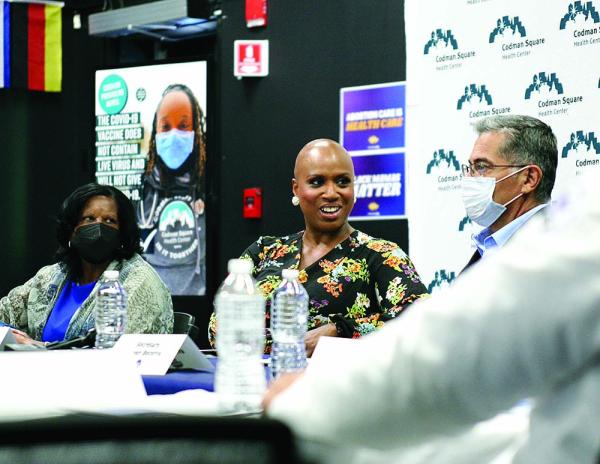September 8, 2022

US Rep. Pressley speaks about the new maternal care extension of Medicaid from 60 days to 12 months in Massachusetts. Listening is HHS Secretary Becerra.
Seth Daniel photo
Congresswoman Ayanna Pressley and Xavier Becerra, President Biden’s health and human services secretary, visited the Codman Square Health Center last Friday afternoon to talk about Black maternal health issues and abortion care access, keying off the US Supreme Court decision earlier this year striking down Roe vs. Wade.
They were joined at the roundtable discussion by local leaders, health providers, and advocates, including Black maternal health advocate Nneka Hall of Mattapan, Codman Square Health Center CEO Sandra Cottrell, Dr. Alisa Goldberg, Everett Handford, Dr. Teju Adegoke of Boston Medical Center (BMC), Michael Curry, Melanie Egorin, and Dr. Renee Crichlow of Codman Square Health Center.
Becerra was there to tout the newly approved extension of Medicaid postpartum care, which had been called for by Pressley and was granted to Massachusetts in late July. “We’re allowing a mother to thrive with their baby if we do this right,” Becerra said. “We’ll be taking care of them not just for 60 days, but for a full 365 days now after delivery.”
He added that the community health center networks are organizations the federal government wants to invest in, particularly since they showed how effectively they can deliver health care when it came to COVID vaccinations. “We want to do more because health centers have proven themselves,” he said.
One of the doctors at the event, Renee Crichlow, said the extended Medicaid in Massachusetts allows them to better care for low-income women after they deliver. At the same time, it’s also a period where they can catch other issues more readily like diabetes and hypertension.
Mattapan’s Hall, who has been an advocate for the doula system and for home birth, told Becerra that more needs to be invested in those systems for women of color especially.
Becerra agreed. “We’re going to be making future investments in the doula programs,” he said, “because they are very effective and we get so much out of them.”
The remainder of the roundtable discussed the fallout from the decision to overturn Roe vs. Wade, triggering laws in many states that ban abortion care in all, or some forms.
Pressley said Massachusetts is fortunate to have continued access to abortion care, but she said the trauma of the decision hit her and those she knows heavily. She was at her daughter’s 8th grade graduation when the news came to her.
“I immediately understood that my daughter would be growing up in a country with fewer rights than I had,” said Pressley.
Hall said there is no safety net for those who cannot afford to travel to get an abortion in a state like Massachusetts that still allows it. “When the rug is pulled out from under you and it’s solid underneath you, you don’t fall, but when it’s pulled out from under you and there’s nothing under it, you fall and you have chaos,” she said.
“Right now, there is a safety net and many of our mothers don’t have the resources to travel across state lines.”
Becerra pointed to St. Louis, Missouri, where a trigger law outlawed abortion providers there, but only 12 miles away across the border in Illinois, abortion providers are still operating. “I don’t believe Americans will tolerate having disparate treatment only miles from each other,” he said. “I think they will react…What we need to do is work really hard to not let people fall through the cracks. We’re going to do everything we can.”
He noted the federal government is enforcing all occasions where federal law supersedes state law, such as when a doctor decides to perform an abortion on an emergency basis. That decision, he said, is protected by federal law even in states with very restrictive abortion laws.
Dr. Adegoke of Boston Medical Center said they have seen people coming to the hospital for abortion services from other parts of the country, most of them initially from Texas and the southern states. “Folks call and are able to come here and do so because they have resources,” she said.
“They can afford a plane ticket to make an appointment within 36 hours. My question is how many people can do that?”


